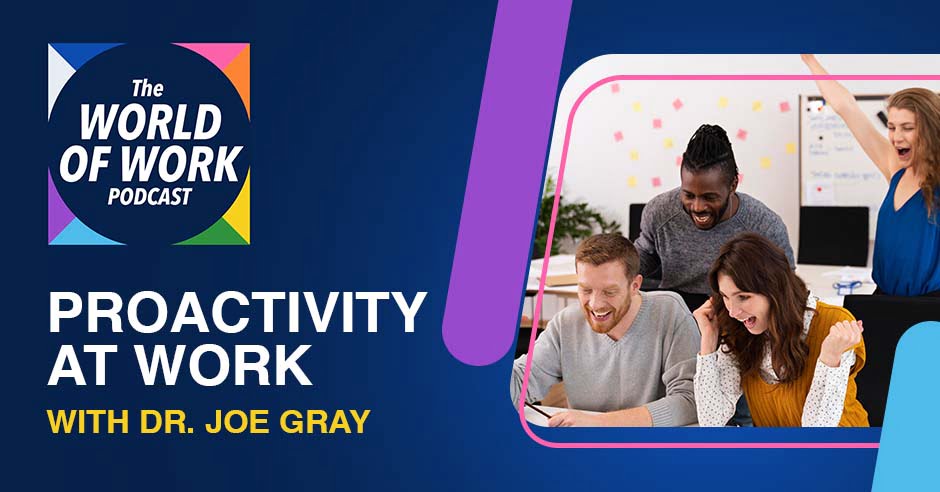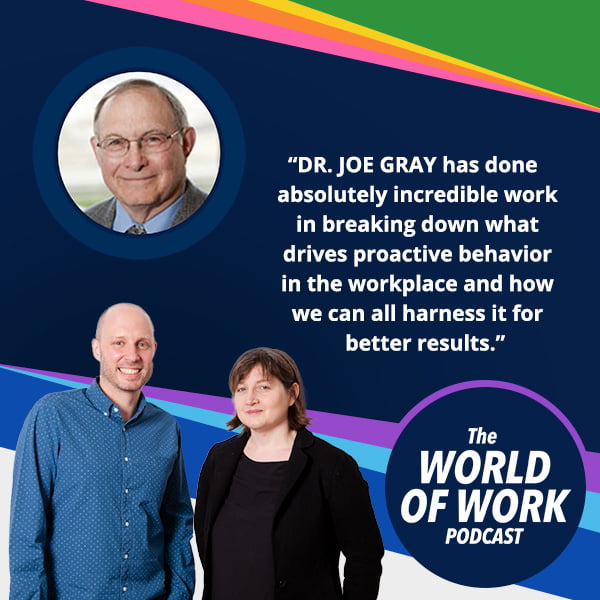
Every employer loves proactive employees on their team. But what does proactivity in the workplace even mean? For the uninitiated, it is often confused with volunteerism, but in reality, it is the exact opposite. But what most people would agree on is that proactivity does wonders in productivity, efficiency, and efficacy at work. Dr. Joe Gray joins us in this World of Work episode to break this concept down. She discusses how people are motivated to manifest proactive behaviors, why there is a dark side to proactivity, and what its positive effects are when done right. Join in for a fruitful and insightful conversation!
—
Listen to the podcast here
Proactivity At Work With Dr. Joe Gray
I wanted to let you know that as well as these episodes, we deliver at least one free online seminar every month that you’re welcome to attend wherever you are in the world. You can learn more about them and register for them via our website www.WorldOfWork.io.

Welcome to this episode. We’ve got an exciting conversation today and a great return conversation. We’re speaking to Joe Gray, who’s a friend of ours, a friend of a show, and someone we work with quite a bit. Somebody who has recently completed their professional doctorate and is going to be speaking to us about one of our favorite topics, which is proactivity. Joe, before we get into that, delve in, unpick it and explore what it is, would you be able to introduce yourself to the audience? Again, having done this before and say a bit about yourself and your background.
Thanks for having me back because I enjoyed the last one, which was quite a few years ago, talk about hybrid working. Interestingly, without doing too much of a digression, it was the work on hybrid working that brought proactivity to the fore for me, that wanted me to explore it a little bit more. This is quite nice.
Book ending. How wonderful.
For those who maybe didn’t read that episode, my name is Joe Gray, Doctor in Occupational Psychology. Prior to what I’m doing now, I had many years in industry working in sales and marketing and various different organizations. I am mainly working in leadership development. I’m a part of the teaching team at Birkbeck University in London and various other little fingers and pies. Trying to do lots of things where I can learn loads and bring my insights.
What Proactivity In The Workplace Looks Like
Bits of consulting, training and development. As I mentioned, you do a bit of work with us, which is always a pleasure. We’re going to be chatting about proactivity. It’s funny, when you mentioned the remote stuff we did, I remembered. I’m like, “I remember proactivity being one of the things that we looked for in there.” How cool that it led to this detailed focus? Why don’t we start with a question, what is proactivity? What types of things might be proactive in the workplace? What is it we’re speaking about when we say proactive behavior?
It’s good to give a definition because sometimes people think being proactive means putting your hand up and volunteering for staff. Whilst that is helpful in organizations, it’s not necessarily proactivity. Proactive behavior is about being that one step ahead. It’s taking action off your own back, making things happen rather than waiting for things to happen.
Proactivity means taking action, making things happen rather than waiting for things to happen.
It’s that idea of being very self-initiated, change-oriented, and future focus behavior. It’s a bit like mainly driven by, “I don’t like the status quo. Therefore, I need to change it. I’m going to be proactive.” That’s what those three things are about being self-initiated, future focus, and change-oriented. Those are the key. As I said, sometimes I was hearing people describing proactivity by saying, “I put my hand up when I’m getting asked.” That’s been a great citizen at work but it’s not necessarily being proactive.
There’s an invitation there to participate when you put your hand up. Somebody’s asked you a question. Whereas proactivity, from what you said, with self-initiated activity. You’re finding something and leaning into it yourself.
Which is why it doesn’t always go down so well. There’s a good sign and the bad side. We’ll get into some of that later.
We’ll delve into it a bit. I know it’s such a big subject. There’s loads of stuff in there. That’s what it is. It’s got those three points that you raised there. Why do we care? We’re talking about it. There’s an assumption in my mind that proactivity is a good thing like where we’re going into this conversation about framing. As you said, maybe there’s like pros and cons and stuff like that but why should we care? What impact does it have on us as an individual, if we are proactive and practice it out on those around us?
Let me rewind slightly as well. Let me tell in terms of what some of the behaviors might look like. It might be useful. The kinds of productivity and they can be at a individual level. They can be trying to change it and they’ll change things within the organization or team. The types of things that I would describe or if we would describe as proactive. That might be asking for feedback so that you can improve performance for your and enhance your career opportunities. It might be voicing some concerns.
It might be voicing concerns around safety procedures in the organization or if you see some unfairness or inequity and raising that because you believe that’s important that the organization addresses it. It might be that you see a process that’s ineffective and that needs fixing. I’m going to go and make that more effective. That’s the kinds of behaviors. Your question then, why do we care?
We can now start to see, as your organization in a world of work that is dynamic, changing and constantly striving for competitive advantage. We need that innovative behavior. We need that eye on what we should be doing next. We need people to be self-directed rather than waiting for things to be asked. From a helping organization, future proof, and perform well, there’s a direct link with those types of proactive behaviors. Interestingly, if you want a little geeky fact. I did a little search of all Indeed job postings. I put all down different terms that would be described as proactive behaviors and 40% of all job postings claimed that they were seeking a characteristic that you would define as proactive behavior. It’s off the characteristic.
That’s a great geeky fact. I love a percentage and a geeky fact. That brings it all to life. That’s pretty cool. As you were speaking, I was thinking of a few different things there about this topic and some of the impacts and benefits. One of the things that came to my mind is that if a decision-making process has to go from somebody on the front line, if you will, up into an organization through another decision-making process and back down. We get all kinds of losses in there.
We get losses of fidelity of data and insight. We get losses of time. We get all this stuff. Presumably, if you’re running in an organization that doesn’t have proactive behavior. You’ve got time delays, quality and data insight delays in terms of what you’re doing. It makes sense for somebody on the front line, on the call face. We want to fix it because it’ll be a better outcome.
It is that idea of being responsive rather than reactive. We’re responding because we’re seeing something’s happening. We do something about it before it becomes a problem. It’s that responsive behavior and preempting that future or into peace. Another geeky fact. I thought it was interesting. I was looking at the World Economic Forum.
They have put out future skills, what skills are going to be important for workers for the workforce, critical thinking, agility, curiosity, a learning mindset, and a learning orientation. This one’s for 2025 and beyond. Those came up just as a few of the top skills. For me, they will go hand in hand with proactive behavior. In terms of our competitive advantage as human beings over machines, that makes sense why these are characteristics organizations are looking for because they are useful skills.
Back to some of the things you mentioned about the agility of the organizations we’re in and the changing world. We got a divus to move quickly. Geeky fact number two, I wish I had like a special sound effect button for Geeky fact. We’ll build one of those. We can do it proactively. We’ve talked a little bit about this. What was it that drew you to study it? You’ve clearly drawn into it. You’ve explored it. Why are you geeking out about your activity?
I have no idea on that. One thing I also highlight at the why should we care about it. At an individual, you can probably think of a time when you have successfully been proactive. It makes us also feel good about change. We make something happen and achieve something. There is also lots of it. It creates positive emotion amongst us. It creates that sense of pride and achievement.
When it goes as well, it can work well. We can stop then thinking about the dark side. Being aware of my own proactive personality and it is innate. I have recognized that’s led to some positive outcomes, but I am also mindfully aware and sometimes it hasn’t. That was like interest like most doctoral students. They do a topic that’s interesting for themselves bcause it’s a bit of a self-discovery and self-exploration.
It’s a healer vibe for whatever reason.
It’s a little bit of that. There was my own personal interest and my own journey of self-discovery. I was interested in this double-edged perspective on it knowing that it can be beneficial. There are pitfalls if it’s overplayed or not as wise as it could be. That was the bit that I was interested in, the multifaceted exploration of it. That’s the bit that I was driven to want to find out more about.
It’s nuanced, isn’t it? If you’re making decisions and implementing things, it’s great if you do it right in a good way. If you’ve misinterpreted it or have a misunderstanding or do it in a way that is somehow detrimental to others or those around you. There are all these risks around it. It’s a hard line to blend. You’ve focused on a few things, but one of the things you’ve done with your research is you’ve delved in and focused a little bit on older workers. Why was that? What led you to them?
Again, without sounding all self-interested and overly self-indulging, but I assume we’ll be categorized as older worker. I’m on my last year before I enter that category, if you will. It’s a bit nonsense. It struck me. As being aware of age, myself, I know I had to plow through hundreds of studies that have explored productivity at work.
When you’re looking through papers, you look at the participants and their age and things. I was like, “Hang on a minute, there’s a lot of participants early to mid-career. What about older workers in all of this?” In fact, my systematic literature review was 25 studies and it was that across all studies was like 20,000 plus research participants. The average age was something like 34. I felt like there was a gap in knowledge for a start.
What I was curious to was to see well are some of the findings. Are they relevant to older workers knowing that as we age, experiences changes? We develop as people and therefore, that might have a place something. As a bit of an activist, I get annoyed when I hear this rhetoric around older workers being change resistant. I hate resistance anyway as a whole frame. That’s different. We’ll come back for a different talk on that.
This idea of older workers and not being proactive, just waiting out for retirement. I thought, “I don’t think that’s true.” Whilst my study can prove that because it’s a qualitative study. I wanted to get a sense of what were people’s experiences of being proactive as an older worker and hearing their stories of proactive experiences, good and bad, how it made them feel, what were the outcomes, and what even motivated them to do it in the first place. That’s what I was interested. It was hearing the stories of older workers who I believe have not been heard as much as they should be.
I know this isn’t maybe the time for it, but do you get a sense that proactivity changes over our lifetimes incidentally? Could you map what you’ve done for older workers to even older or very junior workers? Is there any sense on that?
As a professional scientist and because of the nature of my study, I can’t make generalizations about changes because it wasn’t the nature of the study. I would love for other researchers to be able to do something on a more longitudinal basis or do something that involve a mass survey. Based on the stories that I was hearing, proactivity relies on confidence, self-efficacy, and being confident in our abilities to do things and draws on experience.
Proactivity relies on confidence on self-efficacy.
The logic there is, if I’m am more experienced and I’ve had learnt the hard way. Therefore, technically, I should be more confident in being proactive. What I found was is that certainly the individuals I was speaking to, they were talking about, they are more proactive in areas that are important and interesting to them. They’re not going to start being proactive on something that they can see is going to go badly or genuinely not that interested in.
One of the interesting lifespan development psychological theories is as we get older, we do seek more intrinsically motivating activities in our lives. We want to do more things that we know means it’s important to us. I got a sense of that there was some perhaps more consideration about what I’m being proactive in and what I’m not. There wasn’t probably a little bit more intention around it.

Proactivity At Work: As we get older, we seek more intrinsically motivating activities in our lives. We want to do more things that we know are important to us.
The Science Of Proactivity
Thank you for showing that and I know I asked you to speculate on something a bit there, which is fun to do. That’s helpful. When we think about individuals being engaging in productivity in the workplace, you talked about being drawn to things that are intrinsically motivating. What are some of the reasons that people give when you explode with them for proactive behaviors? What are some of the factors that might lead somebody to be proactive?
I’m going to focus specifically on my insights of older workers. First off, it is important to highlight the distinction between proactive personality and proactive behavior as an almost learned behavior because it is valued in work. It can become a bit of a learned behavior. People are developing it because they know it’s valued and almost positive reinforcement.
Those who are identifying as having a proactive personality and there is a whole questionnaire that you can complete that can determine if you’re on the PPS. As I said, for me, it is an innate behavior. Sometimes I have to have a word with myself to go, “Why are you even doing this? Just stop.” It’s just that drive because I feel like I need to do that. Sometimes, as I said, it’s now having done this. I’m now probably being enacting a little bit more wise productivity. That is important to make that distinction because sometimes, even for those who’ve got a practical person. They probably might not even realize what the reason to. They can’t help themselves.
This would be a fantastic alternative conversation. What is it in that moment that we want to address by taking proactive behavior?
Amongst my participants, there was a mix. Some people said that they identified as practical personality. Others who said it was more of a learnt behavior. Those with a learnt behavior was something they felt had grown over time because of the confidence. In terms of what’s driving that, motives. Our motivation, what motivates us. Achievement motive comes through very strongly and that came through amongst all of my participants. That idea of a sense of achievement from fulfilling, bringing about something and seeing it’s making a difference and seeing people have appreciated it.
Again, that goes back to the pride that comes with achieving. That’s something that came through. As I’d already mentioned, the intrinsic motivation. It seems to link with age and lifespan around because that’s important to me. For example, one participant is very motivated by climate action. Projects at work that were climate action related. That’s what she wanted to be proactive in because for her that’s important.
It’s starts then almost linking into values and what is important to you. I started to then pick up on some values driven motive. For some that’s self-direction. Not be told what to do. For others, that’s creativity. Some people valued the creative process in even ideating change. That piece was motivating. For others, I was getting their fairness barometer on high alert. It was about they were motivated because they want to create more equality and inclusion. Values and motives that are intertwined. The achievement motive was coming through across everybody. Those values driven was more clustered.
People are fascinating, aren’t they? How amazing is the diversity and range of drivers of action that we have. It’s cool. We’ve talked a little bit about productivity, what it is and why it matters. Your interest in studying it and some of the factors that influence people to be proactive and some of the ways it shows up. If we like step back a little bit, how do you go about studying this? How do you even start trying to unpick this and study it from a research perspective? What things do you do?
Your audience can’t see, but you can see my big thick textbook.
I was going to mention it earlier, Proactivity at Work.
It has been my Bible, almost 600-page textbook. That was great starting point. This area of study is not new. This has started bubbling away in the late ‘90s and has come into its own in the last two decades. Certainly, this is something that’s been of interest to researchers for 30 or 40 years. It’s a pretty established body of research, which sometimes is great because there’s lots out there.
I started off textbook, then you then go down rabbit holes for the next couple of years. It’s a massive rabbit hole. I’ve been thoroughly basking in that rabbit hole. I can’t even imagine how many hundreds of studies around Proactivity at Work. The thing is I still don’t get bored of it. It’s a lot of reading and academic papers studies then trying to synthesize that and trying to make sense of it all. There’s quite a few studies that are systematic reviews or meta-analysis. They’ve done some of that hard work already. That helps because it is an established body of literature. There’s some good reviews out there that take away some of that having to synthesize it with yourself.
It’s cool to have something that’s built on. You said you did a qualitative type approach to your actual research.
Again, this is around what was driving me to do the study that I did. Organizational psychology and the literature, that’s where the literature base and management and organizational psychology. A lot of the studies are quantitative surveys, which become insightful. Some rich data among those. There is a distinct lack of qualitative research.
I was keen to have conversations. I want to understand people’s experiences because the drawback of the survey, even when the most sophisticated multifactorial studies because different people and different experiences in the context and all this into plays. You don’t get all of that. That’s the bit that I wanted to get to the heart of, how do good experiences, bad experiences, and what does that lead to? Try and understand more about individuals’ experiences.
That richness of the individual context and the individual background is cool. Qualitative work brings a great depth. We’ve talked about it, explored what it is, thought about this demographic we’re looking at, and some factors. Can we change it? You’ve said yourself that you are a born proactive individual and we didn’t pick what that looked like. Is this something that you’re born with? Is it nature? Is it nurture?
It can be both. I said there’s a personality measure in scales. There are characteristics that are more personality driven, but it is a behavior that can be taught and learned. Interestingly, even not developing it but also stifling it. Going back to that importance of the situation and the context, even the most proactive person in the world in an environment that doesn’t value productivity will not be proactive.
Even the most proactive person will not be proactive in an environment that doesn’t value proactivity.
They will be stifled. Chances are they will leave because guess what? They’re proactive. In the moment, if the environment is not conducive to someone making suggestions or speaking up, then they will be silenced. They won’t be silenced for too long because they will leave. That’s proactive. That, for me, was an interesting insight.
Those who did identify as having a proactive personality and the number of them who record stories other parts of their career where they had gone in organizations and been told, “We’re going through a transformation. Please come in. You’re going to make a difference here.” They came in and used words like, “I came in and I felt handcuffed. I felt silenced. I felt like I was speaking on deaf ears.” That becomes hugely demotivational for someone who likes to bring about change. Your question was, can it change? Yes, and in both directions.
It seems like it can change in both directions. Maybe in two ways. That external context changes it. Presumably, there are internal factors that change it as well. You said potentially every time as we age, stuff changes but no guarantee on that. Presumably, there are things that we can do as individuals,
if we learn, practice, and proactively, unfortunately. It’s like, where does it start? We need to maybe do some of these things ourselves, but we presumably can make some changes ourselves to be more proactive given a stable context.
For me, a lot is about the context and the environment because I believe that you need to get the environment right in order for people to be able to then develop and build the skills in an environment that’s conducive to it. I’m a big believer of fix the environment before you start fixing the people. In this case, if you create the environment and you encourage.

Proactivity At Work: Fix the environment before you start fixing people.
Again, I’ve already mentioned that idea of reinforcement but if you’re creating a psychologically safe environment where you’re asking people, you value their input, their opinions, and you want things to be different and they’re the best people to tell you about it. They’re more likely to do that. I’m not going to give too much away on that because I’m writing a book on that very topic. I’ll come back next year and I’ll join that.
In answer to your question, the environment can influence it. Other people can influence it. I came up with the phrase stifled proactivity. When someone else stops you in your tracks, in most cases, that seems to be someone more senior but you’ve got a proactive endeavor. I’m taking charge of a project to do things differently around here. Guess what? I need to get people on the bus. If they don’t want to get on the bus, they could make life quite difficult. That can be in itself demotivating, de-energizing and a struggle. That can in the end sometimes make you think, I can’t be bothered.” It’s a very social phenomenon, which it’s interesting, isn’t it? It’s an individual behavior that is operating in a very social context.
I was wondering about that earlier. I was wondering people on their own. If you’re in the woods on your own, where does your proactivity balance come from? That’s not something for now. Also, as you were speaking, and again, not for now. I was reflecting a little bit on the broader cultural aspect. You occasionally read things.
I know about the validity of them, but things talking about the ability to innovate and social behavior in different countries reflecting things like their political structures and national cultures. I would hypothesize that there’s maybe something in that national level that would influence some aspects of this. Back to your point about rewards, but behaviors feel good. Does it feel good to be proactive? Does it not? That’s interesting. All that leads to things like innovation, improvement, change, and creativity.
That’s interesting if you think about power distance as a cultural factor. Proactivity does involve that power has been dispersed. In an organization where the power distance is more evident and hierarchy is more valued and respected, then yes. I would say the likelihood is some proactive behaviors are going to be dumbed down because again, we’re creatures of reward and safety.

Proactivity At Work: In an organization is where the power distance is more evident and hierarchy is more valued and respected, some proactive behaviors are likely to be dumbed down.
When you were speaking earlier a little bit about some of the potential reasons why some older workers might have higher levels of potential proactivity. One of the things that came to my mind was that it’s not only that they’ve got potentially the knowledge and skills on which to feel confident to take a proactive behavior.
Quite often, my sense is that as some people get older, they develop some of the skills or broader resources around them to let them more easily withhold potential consequences of reaching some of those power gaps. That power dynamic can dissipate in relationships in the workplace as people get older because they’ve got more background to them, more self-assurance potentially, and more financial resources. It can be something in that lack of consequence of taking what is potentially a risk-taking behavior in terms of doing something proactive. I was like, “It’s risky, but whatever. I can take the consequences.”
Again, that reminding me as that came up, so financial security. It’s not going to be the same for everybody. This was a certain group of individuals. Having less financial security concerns, that was mentioned a few times. This is like, “What I’ve got to lose?” If it’s something that’s important.
“I got the FU money.” That’s what people say.
I did pick up on some of that around going, “What have I got to lose?” There’s almost that a bit more of that carefreeness linked to not necessarily needing the financial security quite as much. As we age, we do become more adept and emotionally regulating and self-regulation. Also, we don’t necessarily get quite as worked up about things that may have bothered us so much in our younger years. There’s a bit of that plays in. People are learning from experiences. There’s another interesting theories without getting into the depth of it. It’s around the fact that as we age, we have a desire to want to have more positive experiences that give us positive emotions. It’s called social emotional selectivity theory.
We need that little geek out bell again.
I know. You should have brought it. It’s interesting because the idea is you want to lean into more experiences that you know are going to make you feel good. I’m potentially then recognizing, “I’ve done that in the past and it wasn’t that great.” I’m not even going to get into that because I don’t want to experience that discomfort and that emotion.
Again, that gets into being a little bit more intentional. One of my participants talked about their cognitive filter and talked about the fact that there’s something going on that they want to be proactive. It’s going to be too annoying and stressful. I can’t be bothered. It’s not worth the energy. There’s that question again that came up about it’s not worth my energy and because of the regulatory, self-regulation and the emotional regulation skills that have been developed over time. I’m not going to get myself bothered about that. What I am going to do is put my energy into that thing over there that does bother me and is important to me. There’s something quite empowering in that. I like that.
All of that speaks to a fair amount of self-awareness. Understanding what you do care about, what you don’t care about, what you can be bothered for, worth fighting for, what will fill your cup, and what’s going to drain you. These are all things that I wish I had more of as a younger person. Wouldn’t it be great to have that as a young person? I like that reference there to worth the effort and worth the energy. We’ve only got so much energy. How do we know when to spend it in the right way? It’s like such a limited resource.
In a way, we wouldn’t have that wisdom in our older years if we hadn’t had that experience. I feel that’s the right of passage we have to be able to learn from.
Playing The Proactivity Game
It’s a price you pay. you’ve got to try all these things to know the answer, don’t you? It’s that influence and control and figuring out where to have that balance as well and accepting the things you can’t change and all of that, which is cool. In your research, I know we can’t cover everything you’ve done and probably we’ll chat about it again. We are going to do a seminar on this as well. It’s an online seminars.
Something I’d like to touch on is that you identified some distinct clusters or typologies that describe how individuals understand their motivation for being proactive at work. Some of those drivers around them and you’ve come up with some names for those clusters of people. Would you be able to delve into that a little bit and share what you’ve come up with?
I’m going to put a little health warning. I don’t like putting people in boxes. I’m coming up with clusters, but also I have a very ordered mind. I like seeing patterns and there was patterns here. Even within this clusters, I can see how the context could make people potentially behave differently anyway. One of the things I found fascinating.
In my research, I conducted two interviews with each participant, which was super helpful because it meant I had rich data. There’s a great in-between part, which was about four weeks. It was great for the participant to try and make some sense. Suddenly, other throwing things that they thought of that they wish they told me, they were able to tell me. I was able to get a second bite of the cherry speak to them twice.
That was great for me because I was able to do a whole load of sense making and start going, “That’s interesting. Let me ask them about this when I speak to them next time.” That’s for me was helpful. The thing that came up on the first interviews that I found fascinating was what I call the language of combat and gameplay. Heads getting shot off. Heads above parapets. Getting your head blown off, and all warfare then the gameplay. People talking about poker playing and waiting for the back going in the back door.
There was some real gameplay going on. I found that quite fascinating. I then almost came up with this idea, “This thing we’re calling proactivity is a bit like playing the proactivity game.” One of my backgrounds had been in the toy industry. I found this particularly interesting. I thought, “If proactivity is like a game, what would it be?” That was one of the questions I asked in the second interviews. That was interesting to get that metaphor. Interestingly, the difference between someone playing Monopoly or chess versus someone playing a game of rounders.
Very three different forms of gameplay. I thought that was interesting itself. I talked around gameplay. I coined four cluster types based on how we play games. The names are strategist, sand boxer, tacticians and corporators. I’m not going to go into massive depth. The strategist values independence, being in control, and feeling empowered. Their proactive endeavors are motivated by achievement and challenge. They talked about being competitive and enjoying a challenge.
Again, as the metaphor, Monopoly came up a couple of times for those types of individuals. These individuals talks about doing the groundwork influencing tactics quite considered in their approach because they want to have a proactive endeavor that has a successful outcome. That was the strategist. The sandbox game are like the ones where you go in the blank screen. It’s a bit like Minecraft. You make your own thing.
The sandbox is bringing the metaphor of creativity and innovation. Again, with that self-directedness and that desire for freedom and independence. The sand boxes describe themselves as being different thinkers. They talk about being perceived as being different and thinking differently. Also, motivated by achievement, but it’s about innovation and ideas. They’re a interesting cluster. They’re all interesting clusters.
The tacticians, if you think about a tactical game, that’s where it’s about everyday moves. You do this and I’ll do that. It’s a little bit more opportunistic, if you will. The participants that I saw demonstrating some of these behaviors tended to describe themselves as proactive behavior, being alert behavior, and not an innate personality trait.
Many of these participants also felt they valued customs within the organization. That value in tradition and conformity, doing what was expected of them and doing the right thing. Whatever that right thing is. Their proactivity was very much associated with doing the right thing for the organization and it was within their job remit. Therefore, it’s the right thing to do. That was the tacticians.
Cooperative games is about working collaboratively and cooperatively. In this context, the cooperators very much valued that sense of belonging, need for others that is very others oriented, talked a lot about fairness, equality, and inclusion. Doing work that’s aligned to those values, being very values driven. This group also talked quite a bit about the younger generation. I found that quite interesting.
That is also linked to age and lifespan. When we start giving a damn about our legacy and what we want to leave. That came through amongst those. That was the four groups. What was quite interesting is after I did this, there’s a significant piece of research that looks at values orientations at work. Schwartz is one of the original pioneers in values at work. There was some at work that brought that to looking at it in quadrants. I married to quadrants. That felt quite validating. They tend to fit within those four quadrants.
Who were you?
If you’d asked me this ten years ago, I would have told you I was a strategist probably because I’m working in consulting. I rely on collaborating and cooperating. I probably think that’s where I would put myself but if you put me tomorrow in a high-pressured competitive commercial environment, I could quite easily fall to the strategist. That’s the point, you can adapt depending on the context. What I certainly wouldn’t be very good at is somewhere where you’re not allowed to be proactive. What about you? I’m interested. Did any of those resonate for you?
Bits of all of them resonated with me a little bit, but in reality, I’m cooperating space as well. That’s where I am. I can connect with that pretty clearly when I see it. If you put me in one of those highly competitive worlds again, I’d probably say, “I’m going to proactively get out of this because this is not the game that I want to play.” This is a different end state. I love that idea of game or your use of game language.
It’s almost game theory for life. One of our factors that influence us when we are proactive whatever values that drive my decision nodes from a game theory perspective and whatever things that motivate me. This is almost a reflection of what is the game that I’m trying to play? What is the game that I’m trying to win? I’m not trying to win some of the games that are described in strategist and tactician. I am trying to win the cooperative game. I’m doing a little bit of sand boxer game playing as well because I like that creativity and space. I feel in control of myself and what I do.
The interesting thing with the sandbox is and I’m only talking there’s only three people within my participant group of fourteen. I could see some of the relevance to some of that. Those who were all working in environments where they did feel a little bit handcuffed. Again, I wonder how a sand box in a different context. This is the bit. I’ve come up with these clusters. I can see how they fit. They’re some parallels with these Schwartz’s work-related values. It’s the difference if you took that person and put them somewhere else. What would that do? Where do they thrive? There is a sand boxer in a different environment and more of a cooperative. That comes back to the environment.
With that layer, if a sand boxer acts as a cooperator in a different environment, is that then effortfully doing that? Is that then bending out of shape? Does that deplate them? Are they going to head toward burnout as a result of whatever that self-regulation is to be that other thing? Will they fit in and be it? It’s interesting. Do you think different organizations design without knowing it, spaces that would be better for these different clusters?
A bit that I’m still not entirely sure is the strategy the survival of the fittest? Therefore, they’re operating like that because of the context. Again, if they went to a more power dispersed environment that was supportive, they would be cooperators. Again, it goes back to the environment and the context. It does have huge influence on how someone enacts their proactivity. With that said, these are also people who talk about enjoying competition and enjoying being competitive. Therefore, in an environment is a little bit less competition and more cooperative. Maybe they wouldn’t enjoy that so much.
I was traveling and I saw somebody with a T-shirt on. It had like a computer game thing and said, “It’s a coop game.” I was like, “That’s fun.” It feels like a bit of a life motto there. I used to play computer games. I remember. I didn’t like playing headset computer games because somebody has to win and somebody has to lose. That seems a bit rubbish. Why don’t we do the cooperative and everybody wins?
You mentioned about the self-awareness piece. Having the self-awareness around what your preference is and then knowing. Therefore, does that environment feel like it’s going to be conducive to what I need? I used the example of lots of people who were proactive who ended up environments who said they wanted that but they didn’t. Having that transparency and that individual has the self-awareness and the organization are very transparent. Only saying we want proactive people, in what way because what productivity do you value?
That’s a lovely layer to bring in.
It is rewarded in this organization. Let’s tell people what it is rather than saying, “We want self-start is all this thing.”
How All Of This Helps Us
What does that even mean? Self-starting in which direction? Thank you very much. Interesting. That’s cool. I’ve enjoyed that little chat there. We’ve got those four things here and we’ve started to talk about where I was going to go next, which is if we know this stuff, how does it help us? If we have this self-awareness about our own proactivity and maybe some of the reasons behind it. You call that the other different factors around our values and our motivations. How does it help us to know this stuff? What good does it do us?
From a fit perspective, as I mentioned, if you can get a sense of that. The way I operate in the way and what the organization values, if there’s a good fit. There’s something in that. From an organizational perspective, given what I’ve said about let’s stop obsessing with fixing people. Let’s get the environment sorted and let’s think what are the things that we can do to entice these types of behaviors. There’s lots we can do.
There’s a lot that leaders can learn and have the job professionals. There’s a lot to be aware of that can make quite a difference to some of the environmental factors. Ultimately, if it’s something organizations are asking for more of, they need to be aware of the downsides and the pitfalls. They need to be aware of what can we do, what interventions can we introduce and allow it to flourish. That’s what we want. You want positive proactive endeavors. You want people to be able to come and make a difference without, as you say.
One of the more and more studies are highlighting the depletive effects that lead to stress potentially burn out because of the energy that being proactive takes. Keep asking people to be proactive without the right environment. We could be handing them a one-way ticket to burnout. There’s a wellbeing consideration that are important to note in all of this as well just to pluck a few things out of the air.
That’s great. A wide range. I like the reflection on wellbeing, the piece around burnout, and shaping the expectations, which improved your organizational performance as well if you do it in the right way. It certainly improves employee retention and career pathways. A lot of things.
The positive outcomes when it goes well is linked to it in a career success, job satisfaction, and high levels of performance. They are some positive outcomes for the organization, retention, as I say. There’s some good reasons to get this right.
A bit of a side question I was just thinking. If somebody finds themselves in a role where they maybe can’t be proactive, but got a bit of a proactive. Is this one of those things where you could be proactive outside of work and that would help you get some of those benefits, do you think? You’d get a little bit of agency, control, and influence maybe in that special place. Does it spread throughout your whole life or do you need to have it in work as well?
I would need to ponder on more. It’s part of my own self-talk in the past. If I’ve been going through something that’s particularly difficult to work, I go, “It’s fine. Put less emphasis on that and dial up your personal life.”
Charity or whatever it is.
I’ve done that myself, but I haven’t come across any studies that speak to that idea of, can you dumb down your desire to want to be proactive in one place but get it somewhere else or get you fixed somewhere else? It’s a great question, but not one I can answer, I’m afraid.
That’s cool. I was just speculating. We’re getting towards the end. What’s next for you? You alluded to having lots of other stuff going on in the proactive space. Are you focusing on new things? Where are you headed? Have you got any teasers of what’s going on?
I am now almost halfway through authoring my first book. I’ve been very proactive in getting down to it but that progress might slow a little bit because I’ve got some other work members that are going to start dialing up. I’m authoring my first book, which is to help leaders and organizations create the right conditions for practical behavior to flourish. That hopefully will be hitting the shelves next summer, if not sooner.
I’m excited about that. That’s all consuming. I’m doing some other projects. Now that this is becoming my be all and end all. It’s interesting the number of organizations that want to talk about, how can we do this? How can we do this that’s linked to competitive advantage, innovation and the innovation piece? I could imagine that I will do more work that is around how do we create more innovative and proactive behavior. That’d be something that I would find very motivating.
That’s very exciting, isn’t it? Roll on summer 2025.
I’ve got my graduation coming up, so that’s exciting. It’s been an amazing journey and one that is continuing. To think that we were talking about productivity and hybrid work years ago.
It’s like 2020 or something like that. A long time ago. Thank you very much for joining us and for sharing your thoughts. I’m sure we’ll speak again soon. In the meantime, can people connect on LinkedIn or get in touch or anything like that? Yes, absolutely.
On LinkedIn, Joe Gray. I think it’s slash the progress lab. I’m happy to connect with anyone because I’ll be definitely sharing more insights on LinkedIn. When my book comes out, I’ll be posting all about that.
I spy a book to we’re coming up.
Exactly. That’d be awesome.
Thank you very much, Joe. It’s been an absolute pleasure and we’ll do it again soon. Thank you.
Thank you.
—
Thanks for reading this episode. Don’t forget, as well as these episodes, we deliver at least one free online seminar every month that everyone can attend. You can sign up for these and our newsletter, the Wow Mail on our website, www.WorldOfWork.io.






